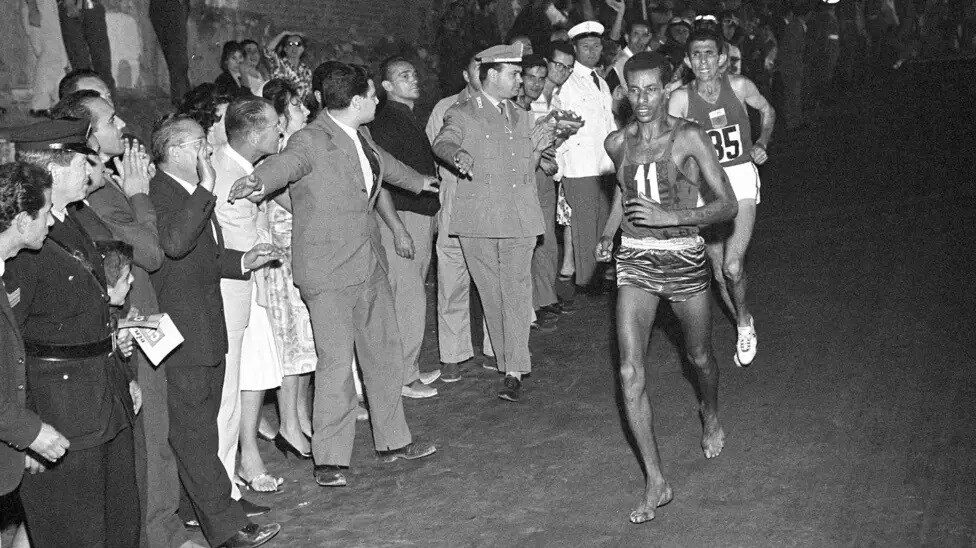 Abebe Bikila (1932–1973) was an Ethiopian marathon runner who gained international fame for his remarkable achievements in long-distance running, becoming one of the most iconic athletes of the 20th century. Here’s a detailed look at his life and legacy:
Abebe Bikila (1932–1973) was an Ethiopian marathon runner who gained international fame for his remarkable achievements in long-distance running, becoming one of the most iconic athletes of the 20th century. Here’s a detailed look at his life and legacy:
Early Life
- Born: August 7, 1932, in Jato, a small village in the Oromo region of Ethiopia.
- Bikila came from a humble background and initially worked as a palace guard in Addis Ababa, Ethiopia’s capital, before discovering his passion for running.
Olympic Success
Bikila is best known for his performances in the Olympic Games:
1960 Rome Olympics:
- First Marathon Victory: Abebe Bikila won the 1960 Summer Olympics marathon in Rome, running barefoot. At the time, most athletes were wearing running shoes, but Bikila’s decision to run barefoot turned into one of the most famous moments in Olympic history.
- His time of 2:15:16 was not only enough to win the gold medal but also set a new world record, breaking the previous record by more than 8 minutes. His victory in the marathon, under the intense summer heat, marked him as an exceptional talent in long-distance running.
- His victory made Bikila a national hero in Ethiopia and brought global attention to Ethiopian distance running.
1964 Tokyo Olympics:
- Bikila returned to the Olympics in 1964 and successfully defended his title in the Tokyo Marathon, becoming the first person to win consecutive Olympic gold medals in the marathon.
- This time, he ran with shoes, having suffered a minor injury in his foot before the race, and finished with a new world record of 2:12:11.
Personal Life and Legacy
- Ethiopian National Hero: Bikila became a symbol of Ethiopia’s endurance, strength, and national pride.
- He was known for his humility and dedication to his sport. After his Olympic successes, he continued to compete in international events and was a source of inspiration for aspiring athletes worldwide.
Injury and Later Life
- In 1969, Bikila suffered a serious car accident, which left him paralyzed from the waist down. This tragic injury effectively ended his athletic career. However, he was determined to stay involved in sports.
- Bikila tried to continue training in a wheelchair, hoping to compete in the Paralympics, but was unable to recover sufficiently to return to competitive sports.
Death
- Abebe Bikila passed away on October 25, 1973, at the age of 41, from complications related to a brain hemorrhage caused by his car accident. His death marked the loss of one of the greatest athletes in marathon history.
Legacy
- Abebe Bikila is considered one of the greatest marathon runners of all time. His feats of winning two Olympic gold medals and setting two world records stand as monumental achievements in the world of athletics.
- He is also remembered for being one of the first athletes to come from sub-Saharan Africa to achieve significant success on the world stage, helping to inspire future generations of African distance runners.
Bikila’s life and legacy continue to inspire athletes worldwide, especially from Ethiopia, a country renowned for producing some of the greatest long-distance runners in history. His legacy is honored in Ethiopia with statues, memorials, and sporting events in his name.
